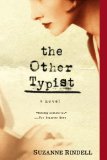Summary | Excerpt | Reading Guide | Reviews | Beyond the Book | Readalikes | Genres & Themes | Author Bio

A Novel
by Suzanne Rindell
The official decree was we were supposed to operate the city's ?rst "crackdown unit." We were to set an example for other precincts to later follow. Extra men were added to our payroll, and we were commissioned with the task of ferreting out the neighborhood's major speakeasies and conducting raids. Of course, a police precinct is a funny thing; the chemistry by which it operates is something like a recipe, and when the ingredients are altered it can take a while until relations come into harmony again. The officers at our precinct were not keen on the introduction of new men, and even less wild about the idea of participating in the chaotic raids that were sure to make them more unwelcome in the neighborhood than they already were, but they had little choice other than to comply. While the men bemoaned these changes, the Sergeant appeared to take his new responsibility seriously. I got the distinct impression he saw it as both a professional opportunity as well as a moral honor, and the inevitable day came when he announced he wanted every individual who so much as transported a single bottle of whiskey over the New York–New Jersey state line to be prosecuted to the fullest extent of the law, a command that kept not only the officers but also the typists at our precinct very busy. It was not long before the unprocessed paperwork began to cause a bit of a clog in the whole system and the holding cell became nothing more than a place for bootleggers to meet their competition and suggest cooperative strategies to avoid future detection by the police.
That's when the Sergeant telephoned the employment agency and asked them to send over another typist.
Odalie's hair was not yet bobbed when she came in for an interview. If it had been, I doubt the Sergeant would have hired her, although I'm certain the Lieutenant Detective would not have minded. Even before Odalie bobbed her hair, I had my suspicions the Lieutenant Detective liked that variety of shocking hairstyle, and the kind of woman who dared to wear it.
I can recall the day Odalie came in and removed her cloche to reveal her jet-black hair swinging in a similar shape just beneath. It had been cut to her chin, the line of it very precise. I remember observing that the cut brought out something vaguely and fashionably Oriental in Odalie's face, especially around the eyes, and the sheen of her hair was very glossy, as though she wore a helmet made of ?nely polished enamel. I also remember catching the Lieutenant Detective regarding her from across the room. He complimented Odalie on her bravery and taste several times that day. As for the Sergeant, he did not officially comment except to mumble over his lunch, to no one in particular, that men were likely to get the wrong idea about a woman with short hair.
But all of that came later. As I said, on the day of her interview Odalie's hair was not yet bobbed. She arrived at the precinct that morning, her face demurely powdered, her hair slicked into a tidy chignon. I remember she wore white gloves and an expensive- looking ladies' suit that matched the robin's egg blue of her eyes, but it was really her voice that left the deepest impression on me, as it revealed the most about what I was later to understand was her true character. It was a husky voice with the kind of low rattling timbre that made you watch the childish curl of her lips very closely to ensure you'd caught the words that were issuing from her mouth accurately. Her voice was like this until something delighted her or made her laugh, and then it rose and fell musically, like someone practicing scales on a piano. It was a paradox of innocent surprise and devilish complicity that proved intoxicating to everyone who heard it, and I wonder sometimes—even now— whether that voice was something she had carefully crafted over the years or if she had simply been born with it.
Excerpted from The Other Typist by Suzanne Rindell. Copyright © 2013 by Suzanne Rindell. Excerpted by permission of Amy Einhorn Books. All rights reserved. No part of this excerpt may be reproduced or reprinted without permission in writing from the publisher.
Your guide toexceptional books
BookBrowse seeks out and recommends the best in contemporary fiction and nonfiction—books that not only engage and entertain but also deepen our understanding of ourselves and the world around us.